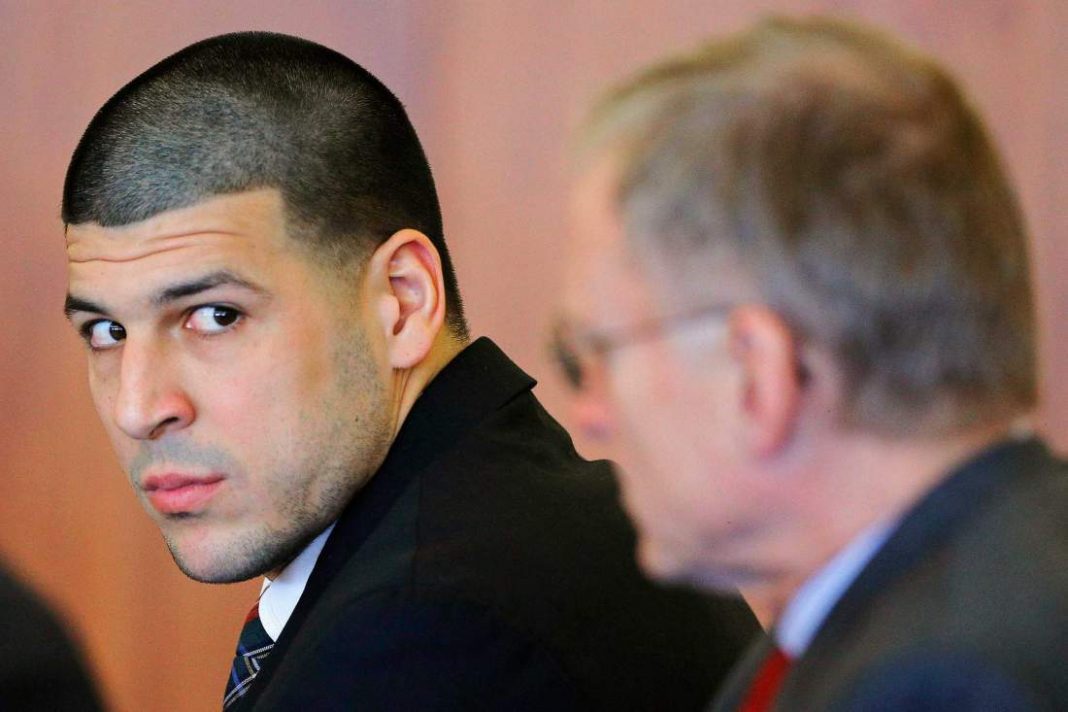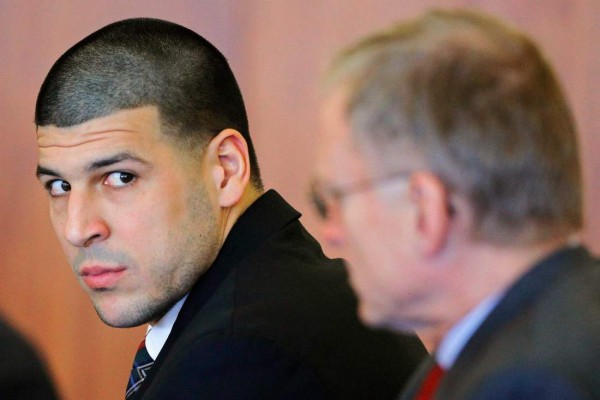
 It doesn’t come as a surprise that the Massachusetts judge who heard the murder trial of Aaron Hernandez has rejected his legal teams motions to throw out his first-degree conviction or at least reduce it to second-degree murder. It didn’t take long for the former New England Patriots tight end’s legal guys to jump into action to toss the conviction which is pretty normal in cases like this.
It doesn’t come as a surprise that the Massachusetts judge who heard the murder trial of Aaron Hernandez has rejected his legal teams motions to throw out his first-degree conviction or at least reduce it to second-degree murder. It didn’t take long for the former New England Patriots tight end’s legal guys to jump into action to toss the conviction which is pretty normal in cases like this.
It’s not over yet for them as they’re still working on their possible jury corruption angle to get a mistrial in the Odin Lloyd murder case. The one person standing in their way again is the judge who has prohibited access to this juror for either the defense team or the prosecution. You can be sure they’ll keep pushing on this angle as it’s their last chance on this verdict.
Superior Court Judge Susan Garsh turned down a motion for a required finding of not guilty in the 2013 killing of Odin Lloyd. A jury convicted Hernandez in April. The motion was a procedural step that had to be taken before an appeal.
“Considering the evidence in the light most favorable to the Commonwealth, the court finds that a rational jury could find that the Commonwealth proved every essential element of the crimes charged in counts 1 and 2 beyond a reasonable doubt,” Bristol County Superior Court Judge E. Susan Garsh, the trial judge, wrote in a June 25 ruling.
After Hernandez was convicted by jury in April of first-degree murder and two firearms charges, his defense lawyers filed a motion asking the court to invalidate the jury’s verdict and find Hernandez not guilty on the murder charge and one of the gun charges. They also asked the judge to reduce his first-degree murder conviction to second-degree murder. Garsh denied all of the requests.
First-degree murder convictions in Massachusetts result in an automatic appeal before the state’s highest court, so the motion filed in Superior Court is not Hernandez’s last chance to challenge his guilty verdict.
The 25-year-old Bristol, Conn. native, who is awaiting a second trial in a 2012 double murder, does not dispute that he witnessed Lloyd’s killing in June 2013. But his lawyers argue that the government failed to prove anything beyond his presence at the scene of the crime. Lloyd, who was dating the sister of Hernandez’s fiancée, was shot to death in a North Attleborough, Mass. park blocks from where the former Patriots tight end lived.
The jury convicted Hernandez of first-degree murder by extreme cruelty or atrocity, one of two legal standards the government can prove to win a first-degree murder conviction.
In their post-verdict arguments, defense attorneys have challenged the extreme cruelty or atrocity element of the crime. While acknowledging that all murders are cruel, they say the six gunshot wounds that killed Lloyd are not so extreme as to merit first-degree murder.
“There was no evidence that Lloyd was tortured or mutilated, that he experienced protracted suffering, or that Hernandez took any pleasure in his pain,” defense lawyers James Sultan and Michael Fee wrote in the motion filed after the verdict, saying the killing did not “deviate in any drastic sense from the norm for such grave and tragic crimes.”
When Garsh gave the jury instructions on how to apply the law, she listed seven factors they could use in deciding whether Lloyd suffered an extremely cruel and atrocious death. One of those factors was “number of blows delivered” – and a juror said after the verdict she found six gunshot wounds “extreme.” Hernandez’s lawyers argue that this case differs from other recent shooting cases that resulted in an extreme cruelty or atrocity finding, and cite cases that involved 15 to 23 gunshot wounds. Before the case went to the jury, they tried to convince the judge to give a different, more limited set of instructions on extreme cruelty or atrocity.
Bristol County Assistant District Attorney William McCauley described the defense motion as “completely meritless” in a filing.
“This was a brutal and senseless crime that was carried out with extreme violence,” McCauley wrote. “The defendant was pitiless, failing to show either mercy or remorse.”
In his closing argument, McCauley spent several minutes reminding the jury of surveillance footage they saw during the trial that showed Hernandez lounging by his backyard pool the day after the killing. Lloyd was already dead, baking in the sun less than a mile away with flies buzzing around his nostrils.
Garsh says in the decision released Wednesday that prosecutors proved their case beyond a reasonable doubt.
The first-degree murder conviction carries an automatic sentence of life without parole.
Still pending is a separate request from Hernandez’s lawyers to investigate an anonymous tip that a juror in the case might have been untruthful during jury selection.

